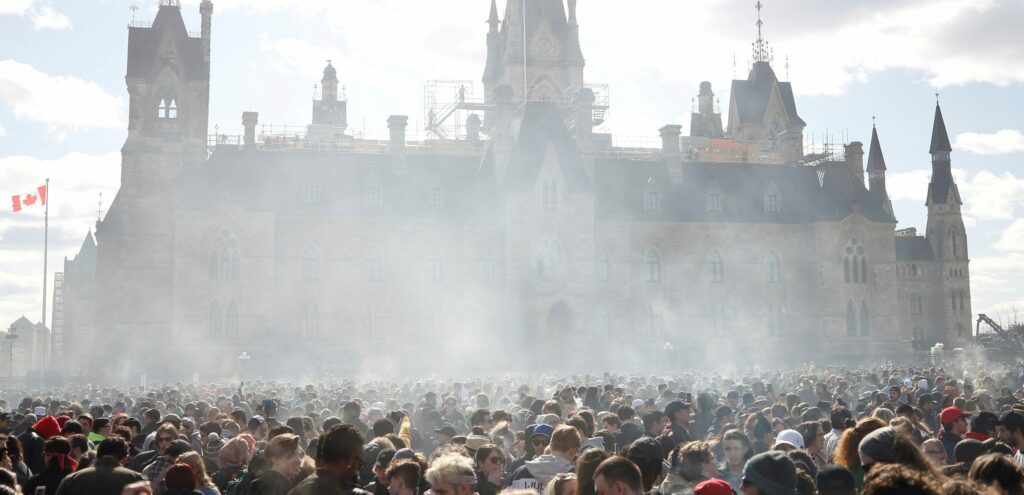Though recreational marijuana use will soon be legal in Canada, use of the drug except for medical reasons remains a sin to be avoided say Canada’s bishops.
“The use of marijuana for recreational purposes goes against the virtue of temperance, which all Christians are required to practice with seriousness of purpose,” said the Canadian Conference of Catholic Bishops’ (CCCB) General Secretary Msgr. Frank Leo.
“The virtue of temperance, as explained in the Catechism of the Catholic Church (2290), ‘disposes us to avoid every kind of excess: the abuse of food, alcohol, tobacco, or medicine.’”
“In a particular way, the Catechism underscores that the use of any drug, except on strictly therapeutic grounds, is also a ‘grave offence;’ for the use of drugs inflicts very grave damage on human health and life (CCC, 2291).”
The Cannabis Act Bill C-45 received Royal Assent June 21 and will come into effect on Oct. 17 of this year. Ottawa Archbishop Terrence Prendergast, whose cathedral opens onto a view of Parliament Hill, said he is not “hailing” the legalization as many others are.
“Recreational use of substances—whether marijuana, other drugs and opioids—is part of a continuum of consumption of substances that allow people to escape what they regard as the burdens and challenges of life,” Archbishop Prendergast said.
“Bishops, priests, catechists, youth and pastoral care works will need to give teaching on temperance and how it comes into play in the decisions we take. Guidelines for confessors should help them assist penitents with wise guidance in this matter, as in our day that have had to help the faithful in addressing other contemporary problems such as the plague of pornography.”
The archbishop also stressed the role parents must play in ensuring their children do not use the drug.
“Parents have a duty to see to the health of their children and to equip them to make wise choices,” the archbishop said.
“Parents try and discourage their teens from smoking and underage drinking so how is marijuana use different? They also counsel young adults about overindulging in alcohol, drinking to get drunk or binge drinking.”
“If a teen’s parents forbid marijuana use there is another moral issue that comes into play – that of disobeying God’s commandment to honour one’s parents by following their guidance,” he said.
“Our bodies are ours to use but we have to account one day to the Lord as to how we took care of them and what we did with them,” Archbishop Prendergast said. “Is it a good idea to knowingly use a substance that produces harmful effects? Is this wise stewardship?”
Both Archbishop Prendergast and the CCCB General Secretary stressed the serious health effects of marijuana use, especially on the young. The bill allows children aged 12 to 18 to have up to five grams or the equivalent of about 10 marijuana cigarettes in their possession that they can share with others.
The CCCB issued a statement in 2017 on the opioid crisis that warned Parliament’s intent to legalize marijuana use was “unwise.” Msgr. Leo noted the CCCB had consulted with addiction specialists, social workers and medical professionals before making it.
“From the standpoint of public health, not only does this course of action appear to be unwise, it is potentially dangerous,” the CCCB 2017 statement said.
“The very significant health risks associated with the use of cannabis are widely recognized, particularly in young people. They include the heightened risk of heart attack, stroke, all of the respiratory and carcinogenic pathologies associated with tobacco smoke, and a multitude of psychiatric disorders, including schizophrenia.”
“Studies have pointed to marijuana as a ‘gateway drug,’ underscoring the propensity of users to consume it in combination with other licit and illicit drugs, including some which may be ‘harder,’” the statement said.
“At a time when so many resources are already being spent to discourage recreational tobacco use, it is difficult to comprehend the disregard for public safety entailed in legalizing marijuana, which is arguably much more dangerous.”
“The Catechism also states that clandestine production of and trafficking in drugs are scandalous practices, which ‘constitute direct co-operation in evil, since they encourage people to practices gravely contrary to the moral law,” (CCC, 2291), Msgr. Leo said.
“To this latter point might be added the legalization of drugs for recreational purposes, for this legalization risks being another way to proliferate seriously addictive substances as well as to condone practices which harm individuals and society as a whole.”
“There is some reported medical benefit to the use of the active ingredient in marijuana to help specific problems such as nausea or loss of appetite in people undergoing cancer treatment who experience adverse effects from chemotherapy,” said Archbishop Prendergast.
“Medically supervised use to alleviate symptoms where other options do not work and whose purpose is to help should be viewed differently from recreational drug use.”
CCCB Statement on the Legalization of Cannabis/Marijuana for Recreational Use

